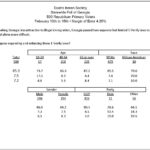FAIR Responds to the Wall Street Journal
FAIRus.org
Barely 24 hours after Senate negotiators released their “border security deal,” the editorial board of the Wall Street Journal published an editorial extolling its virtues. The piece, entitled “A Border Security Bill Worth Passing,” not only argues that the Senate should pass the legislation negotiated in secret by a handful of Senators, but that Republicans who vote against it will do so only because they want to preserve an effective election year issue.
Three days later, most Republicans did vote against the Senate border security deal. While it is impossible to know what was in the minds of each Republican who voted against it, we do know from the whirlwind of media coverage that many did so because they thought it was bad policy.

FAIR agrees: it is bad policy. Having spent 45 years focusing on nothing but immigration, we know President Biden could end the border crisis simply by enforcing existing immigration laws. But, because the President refuses to do so, we have urged Congress to act. Sadly, the package proposed by the Senate negotiators – and supported by the Wall Street Journal – is not only ineffective, it makes the situation worse.
To illustrate our point, we took the time to review and rebut the Wall Street Journal’s editorial. For those who appreciate a robust public dialogue, here is our response, presented as annotations to the original text.
WSJ: Do Republicans want to better secure the U.S. border, or do they want to keep what has become an open sore festering for another year as an election issue? That’s the choice presented to Congress this week with the rollout of the Senate’s bipartisan border security bill, and we’ll soon learn what the GOP really wants.
By any honest reckoning, this is the most restrictive migrant legislation in decades. Previous immigration talks have involved trading security measures for legalizing more immigration. There is little of the latter in this bill—nothing for nearly all of the Dreamers who were brought here illegally as children, no general pathway to citizenship or green cards for most illegal immigrants already in the U.S.
FAIR: The toughest legislation in decades is H.R. 2, which the House passed in May. That did not have any legalization provisions either. Senator Schumer refuses to take up that legislation, but Senate Republicans have already voted in favor of that bill as an amendment to the debt ceiling agreement. Senate Democrats, of course, voted it down.
- The argument that we should pass a bill because it does not have amnesty in it, regardless of whether the provisions on the bill are good for the future of our country, is short-sighted. The ultimate factor in whether Congress passes immigration legislation should be whether it serves the national interest. If it does not, Congress should reject it. That is not to say no compromises can ever be made. But once something is codified into law, it is harder to repeal it than it was to actually pass it. The time to ensure legislation is sound is before it becomes law.
- The Senate bill should be rejected because it will not fix the border crisis. Not only does it fail to stop asylum abuse, it encourages it. It does not end catch-and-release, but instead condones it and does nothing to stop the abuse of humanitarian parole.
- Just to note, there is one amnesty provision in here. The Senate deal does include a pathway to citizenship for tens of thousands of Afghan nationals who were illegally paroled into the United States. We strongly oppose this: (1) because they were illegally paroled into the U.S. and that action should not be ratified by subsequent legalization; (2) multiple government reports detail how these parolees were not adequately vetted; (3) the legislation allows the Secretary to waive crimes committed by these parolees when applying for legalization.
WSJ: This is almost entirely a border security bill, and its provisions include long-time GOP priorities that the party’s restrictionists could never have passed only a few months ago. Republicans demanded border measures last year as the price for passing military aid for Ukraine, Israel and Pacific allies. Democrats resisted at first but later agreed to negotiate and have made concessions that are infuriating the open-borders left. Will Republicans now abandon what they claimed to want?
FAIR: Republicans (and FAIR) demanded meaningful policy changes, not money. The Senate bill offers billions in appropriations, but it already did that when it was first introduced last year. Throwing money at the problem will not solve it, and this has been our argument all along.
- This bill does NOT contain meaningful policy changes, and in fact, does more damage. Meanwhile, billions of dollars are still given to CBP and ICE to process and release illegal aliens. For example, over $1.4 billion goes to FEMA’s Shelter and Services programs which funnels that money through nonprofits to provide illegal aliens social services.
WSJ: The bill’s details are worth describing because they’re crucial to reducing the current incentives for migrants to come to the U.S. border. Most important, the bill rewrites the standard and process for granting asylum in the U.S.
FAIR: The Senate bill doesn’t re-write the asylum process, it just creates a new one. It dramatically increases the incentive for asylum fraud, encouraging aliens to claim fear in order to be released and obtain a work permit faster. Further, more are likely to claim asylum if they know they may obtain it within days by an asylum officer rather than going before an immigration judge.
WSJ: Under current law and practice, migrants cross the border, turn themselves in to border patrol agents, and claim asylum. If they pass the deliberately low bar for claiming “credible fear” of persecution, they are given a date for a future asylum hearing and released into the U.S. The wait can take years, and many never show up. This is the policy that has become known as “catch and release.”
FAIR: The Senate bill actually codifies this practice—except that under the new process, the aliens must be released before they are ever interviewed by an officer.
- Section 3141 of the Senate bill creates a new asylum process called “Provisional Noncustodial Removal Proceedings.” This asylum procedure can apply to virtually anyone who crosses the southern border and claims asylum. The only real limitation is that aliens must be encountered within 14 days of crossing the border and within 100 miles of the border. These are the same requirements for applying expedited removal and generally covers most illegal border crossers.
- Aside from this time and distance requirement, the Secretary of Homeland Security has complete discretion to divert any alien – and every alien – who claims asylum into this new asylum process.
- Once placed into this process, the aliens “shall be released from custody.” DHS has no discretion. Thus, the new asylum process codifies a new catch-and-release process, or what I would call a “claim-and-release” policy.
- Regarding the years-long wait to conduct proceedings, the Senate bill does say that under this new process DHS must conduct initial protection screenings within 90 days after the alien is determined inadmissible. However, that language has a huge caveat: “to the maximum extent practicable.”
- In government-speak, that means there is no deadline. Given the volume of illegal aliens, the lack of facilities to undergo a screening (as required in the bill), the insufficient number of asylum officers, and the time and money it will take to hire and train enough asylum officers, this deadline will never be met. [It generally takes a full year for USCIS to hire and train an asylum officer and the fail rate is roughly 25%. USCIS will need hundreds of new asylum officers to pull this off.]
- The authors of the bill know this full-well, which is why they also provide that if DHS does not conduct the initial asylum screening within 90 days, the alien “shall be granted” work authorization. Mandatory release plus work permits equals a massive incentive for asylum abuse.
- So in reality, this provision codifies mandatory release, but the backlogs continue. It just moves the backlog from the immigration judges, who currently conduct asylum hearings for border crossers, to asylum officers. It turns asylum officers into judges, but the government attorneys are not allowed in to make their case.
WSJ: The new bill raises the bar for that initial border screening for credible fear to a “reasonable possibility” of persecution. Toughening the asylum standard was a priority of the Trump Administration, but a statutory change is needed to make it permanent. Migrants will have to show they couldn’t have moved elsewhere in their own country to avoid persecution before seeking refuge in the U.S.
FAIR: The Senate deal does increase the evidentiary standard for credible fear. However, the change in this bill is one grade up and still constitutes less than 50 percent likelihood of success of establishing a valid case on the merits. In contrast, H.R. 2 would have implemented a higher, “more likely than not” standard, which is equal to “preponderance of the evidence.” (See chart below published by USCIS). The change is an improvement, but it’s still a low bar… there is more from FAIR here.




































You must be logged in to post a comment.